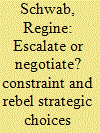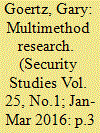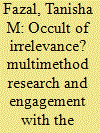|
|
|
Sort Order |
|
|
|
Items / Page
|
|
|
|
|
|
|
| Srl | Item |
| 1 |
ID:
191058


|
|
|
|
|
| Summary/Abstract |
Theories of interaction among rebel groups in civil wars, like other works in the armed conflict literature, continue to see force as foundational to the trajectory and outcome of conflict. But evidence from inter-rebel conflicts in the Syrian war, which has been one of the major civil wars of our times, shows that military force is not always the preferred tool even in situations where violence is presumably cheap: in conflicts between dominant rebel groups and weaker rivals. Rather than using force, Jabhat al-Nusra, one of the strongest groups in the Syrian conflict, frequently chose to negotiate with rivals. Existing theories of inter-rebel conflict fail to explain such variation in responses. As an explanation of this puzzle of non-force, I argue that the constraint emanating from the conflict with the main enemy determines rebels’ strategies towards rivals. To investigate this argument, the paper draws on the triangulation of original data on inter-rebel conflicts in Syria, encompassing written agreements between Jabhat al-Nusra and other rebel groups, a database of important military operations in the Syrian civil war since 2011, and interviews with civil and military participants in the insurgency. The findings have important implications not only for our understanding of inter-rebel dynamics in the Syrian conflict but also for other complex civil wars concerning the relationship between inter-rebel negotiation, cooperation, success, and war duration.
|
|
|
|
|
|
|
|
|
|
|
|
|
|
|
|
| 2 |
ID:
147899


|
|
|
|
|
| Summary/Abstract |
This article conceptualizes multimethod research as doing cross-case causal inference—statistical analyses, experiments, or Qualitative Comparative Analysis (QCA)—together with within-case causal inference in the form of case studies. In addition, game theoretic multimethod work is explored as combining a game theoretic model with case studies. The role of case studies is to explore causal mechanisms which cannot be captured in the cross-case, for example, statistical analyses. The article then describes the logic of case selection for case studies in order to explore causal mechanisms. Various combinations of X and Y variables are analyzed, some of which are useful for causal mechanism analysis and others which are not. Finally, the Avoid Overdetermination Rule is presented, which deals with issues of confounders, control variables, and alternative explanations.
|
|
|
|
|
|
|
|
|
|
|
|
|
|
|
|
| 3 |
ID:
147900


|
|
|
|
|
| Summary/Abstract |
Formal theory and historical case studies, especially those that use process tracing, are extremely well suited companions in research. To bolster future research employing both case studies and formal theory, we suggest some best practices as well as some (common) pitfalls to avoid.
|
|
|
|
|
|
|
|
|
|
|
|
|
|
|
|
| 4 |
ID:
147901


|
|
|
|
|
| Summary/Abstract |
Many security studies scholars concerned with the policy relevance of the field have argued that the use of quantitative methods impairs policy relevance. I investigate this claim by looking at the relationship between research methods on the one hand and the supply of and demand for policy-relevant research on the other. I argue that scholars using quantitative methods, either on their own or in tandem with qualitative methods, appear to be increasingly likely to conduct and disseminate policy-relevant research. I also find that curricular changes in policy schools as well as new information technologies mean that policymakers are increasingly able to consume research based on quantitative methods. These trends suggest that the current focus on methodology as the explanation for policy irrelevance may be misplaced.
|
|
|
|
|
|
|
|
|
|
|
|
|
|
|
|
|
|
|
|
|